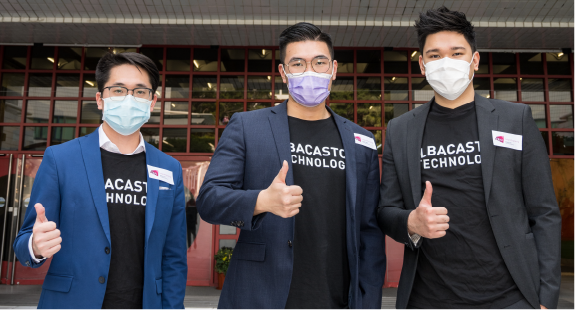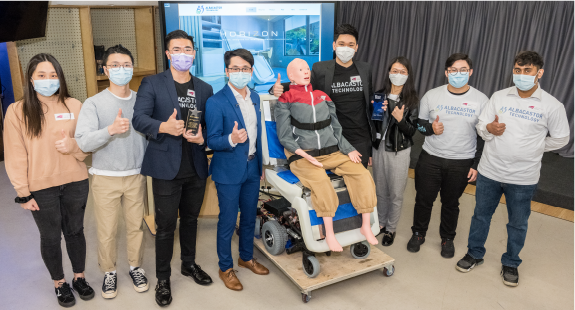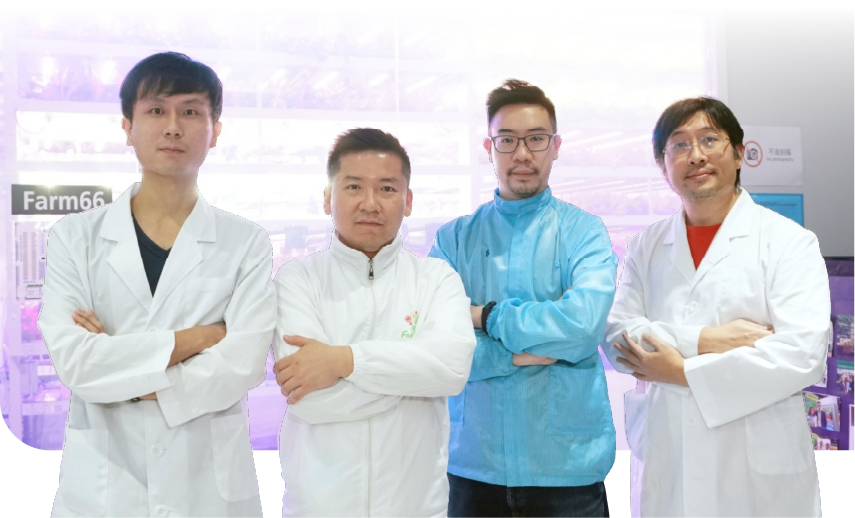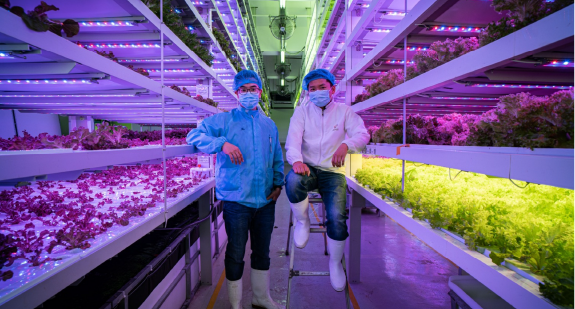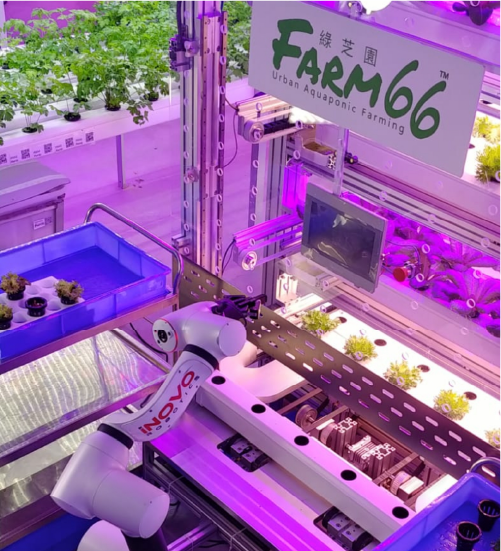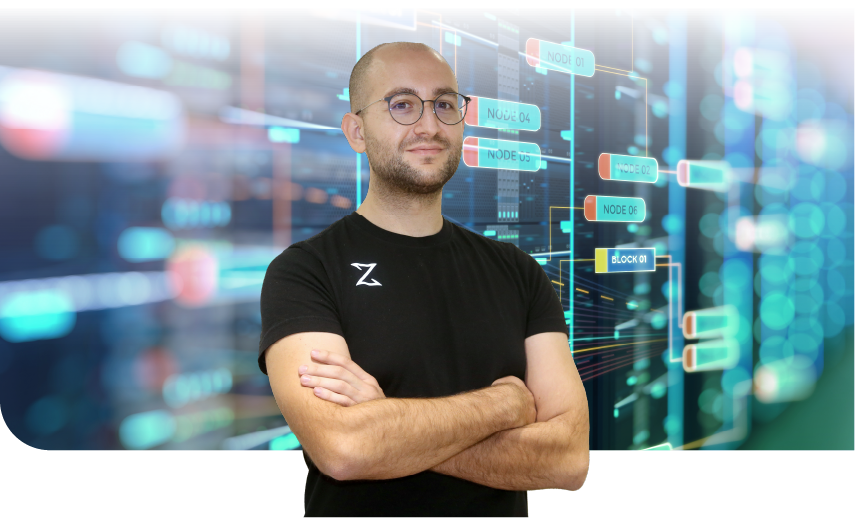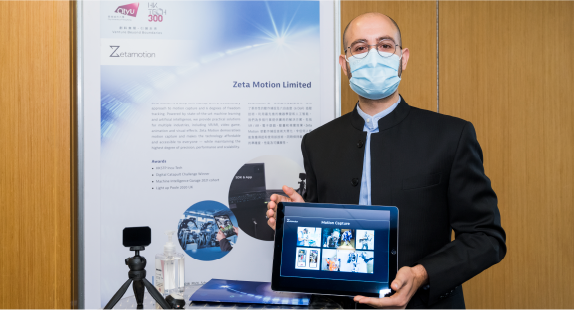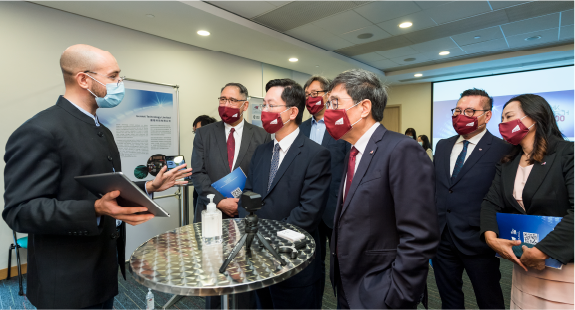Alumni in Conversation
Alumni start-ups in the spotlight
Six entrepreneurial alumni teams discuss setting up their diverse enterprises through the support of CityU’s HK Tech 300 initiative and how they are aiming to reshape society.
Intelligent transfer robot lifts the lives of the less mobile
Albacastor Robotics Limited 艾柏輪智能機械有限公司
Henry Lam Wah-shing 林華盛(right 右)
BEng (Hons) Mechatronic Engineering and PhD Candidate, Biomedical Engineering
機電一體化工程學榮譽工學士及生物醫學工程學系博士生
Co-founder and Chief Executive Officer
企業創辦人及行政總裁
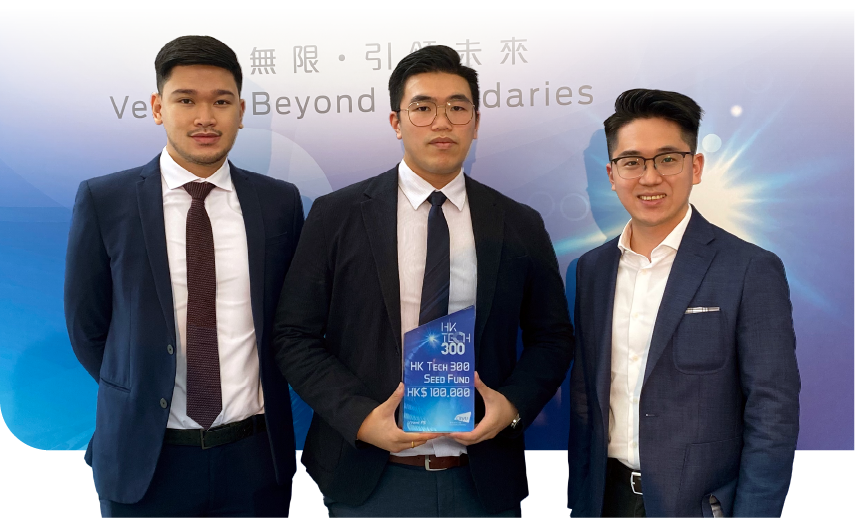
With help from CityU’s HK Tech 300 and Hong Kong Science and Technology Parks Corporation, Henry (right), Peter Cheung Wing-hong (left) and Hugo Chan Tsz-lung (centre) have achieved their dream of starting a socially responsible company.
獲城大「HK Tech 300」及科技園公司共同培育,助林華盛(右)、 張永康(左)及 陳子龍(中)實現初創夢。
It proved a life-changing moment when alumnus and current Biomedical Engineering doctoral candidate Henry Lam Wah-shing first realised the difficulty for wheelchair users in getting into vehicles, such as taxis, without help. He then decided it was time to remedy the trying situation by utilising the knowledge and skills he gained at CityU to develop solutions for people needing assistance in transferring from one place to another, and their carers.
To achieve this goal, Henry founded Albacastor Robotics Limited in February 2021, together with fellow CityU Mechatronic Engineering alumni Hugo Chan Tsz-lung and Peter Cheung Wing-hong, who share Lam’s vision and passion. Fostered by the University’s HK Tech 300 initiative and Hong Kong Science and Technology Parks Corporation, the company has gone on to develop “Horizon”, an intelligent transfer robot that can autonomously move a person from a bed to another “platform”, such as a chair or toilet, giving more freedom to the transferee and relieving their carers of a great amount of repetitive and physically demanding work. Albacastor is also committed to research and developing other innovative technology that can bring greater convenience to people’s lives, especially the elderly.
“Our dream was to start a socially responsible company, and that’s why we decided to focus on applying robotics to healthcare,” Henry explained. “Our intelligent transfer robot, with its various sensors and movable horizontal transfer platforms, can handle the complicated procedure of moving a person from a wheelchair to a bed safely and easily. Previously, this would require the assistance of several carers.”
Henry acknowledged how his team’s entrepreneurial journey had been ignited by the inspiring environment for putting new ideas into practice at CityU, with HK Tech 300 being a particularly valuable way to kickstart the founders’ dreams. Albacastor also received funds from the CityU Student Early Entrepreneurship Development Scheme (SEEDS), which accelerated early-stage development. Meanwhile, the Centre for Robotics and Automation at CityU has provided the professional advice needed to overcome technical difficulties.
The team is now preparing for the launch of a pilot project in private nursing homes and hospitals. The project will enable them to collect and analyse data over a period of months to review the efficiency and safety of the transfer robot. “This will lay the groundwork for a future ecosystem of smart hospitals or smart elderly care, contributing to greater public well-being,” he said.
Henry (first left) attributes the motivation to pursue an entrepreneurial venture to the encouraging environment at CityU.
林華盛(左一)指出,城大充滿創意氛圍,正是三人科創之旅的起點。
開發過床智能機械人 減省醫護重複工序
城大校友(現生物醫學工程學系博士生)林華盛留意到輪椅人士在無人幫助下難以乘搭的士,促使他踏上創科之路,去年2月更聯同兩名志同道合的校友陳子龍和張永康創立艾柏輪智能機械有限公司,研發出「智能過床機械人Horizon」,協助醫護人員處理重複及需要大量體力勞動的護理程序,並銳意開發更多新技術,冀為使用者帶來便利生活。
林華盛作為城大「HK Tech 300」及科技園公司共同培育的初創團隊成員,指出整個科創旅程正是由充滿創意氛圍的城大開始。「我們的夢想是發展具社會抱負的初創,因而決定研發應用於醫療層面的智能機械人技術,使本來需要多位醫護人員合力才將體弱病人從輪椅移送到病床的繁複工序,交由裝設不同傳感器及橫向移動平台的智能過床機械人處理,安全又輕鬆,以回應醫護人員的需求。」
林華盛及團隊感謝城大特設「HK Tech 300」創新創業計劃,讓具備創科概念的學生與校友實現初創夢。艾柏輪早期亦受惠於城大的「創意種子計劃」資助,加速研發過程;配合校內的「機器人與自動化研究中心」提供專業意見,亦適時解決技術困難。「我們正準備在私人院舍推出試點項目,藉取得三至六個月數據分析,檢視智能機械人的成效與安全性。冀在未來打造智能醫院或智能護老服務生態圈,造福公眾。」
Billy Lam Chi-yeung (second right) and his R&D team have led the way in indoor farming in Hong Kong, substantially contributing to local agricultural development.
畢業於城大應用化學系的林志揚(右二)與研發團隊,致力革新室內種植技術,為本地農業發展貢獻良多。
As the first indoor aquaponic ecosystem farm in Hong Kong, Farm66 has been committed from the outset to exploring new technologies such as energy-efficient LED lighting and aquaponic eco-farming to promote the development of indoor cultivation. Established in 2013, the company and its drive to innovate can be traced to the university days of Billy Lam Chi-yeung, one of the founders, who became passionate about research as a CityU student. Billy, along with his partners, later decided to try to make a difference to the wider community by moving green entrepreneurship forward.
When the pandemic became more widespread in Hong Kong at the beginning of 2022, transportation issues regarding supplies from mainland China hit fresh food particularly hard, with the escalating price of vegetables causing concern in many different sectors. Local agriculture then came into its own, especially Farm66. Billy noted the company had developed and customised an intelligent farming system a few years ago to enable a farm-to-table supply chain for organisations and hotels. The company collaborated with schools for promotion and allowed students to participate in the study. “We also worked together with property developers to set up home-use copies of our intelligent farming system and farming areas in housing estates, allowing users to grow their own vegetables for cooking, while also bringing greening to residential areas,” Billy said. Such a variety of experience and connection then positioned the indoor farming company to respond promptly when the community faced this year’s vegetable supply chain challenges.
On lessons learned as a start-up entrepreneur, Billy acknowledged the importance of support funding, giving as examples the Hong Kong Science and Technology Parks Corporation and Cyberport incubation programmes that played a critical role in Farm66’s early operation and business expansion. In addition, cooperation with CityU not only helped the brand gradually establish its presence in the market and academia, but also assisted the company in applying for and gaining support from the Innovation and Technology Fund for Better Living, launched by the Innovation and Technology Bureau, to undertake two new research projects.
Although Farm66 is now running smoothly, Billy’s desire to find new avenues and always improve, sparked by his years at CityU, remains undiminished. To prepare the way for the company’s future, he is still developing new technologies and striving to contribute to the development of agriculture in Hong Kong.
Billy (left) and co-founder and CEO Tam Chi-ho launched Farm66 together in 2013, helping the first indoor aquaponic farm in Hong Kong to thrive.
林志揚(左)與共同創辦人兼行政總監譚嗣籇於2013年共同創立綠芝園,以創新精神推動全港首間室內「魚菜共生」種植場茁壯成長。
化大學研究為創業實踐 革新室內種植技術
綠芝園作為全港首間室內「魚菜共生」種植場,自2013年創立至今,一直致力研發「節能LED光波種植技術」及「魚菜共生生態循環技術」等新技術,發展室內農業。這與畢業於城大應用化學系創辦人之一林志揚的背景大有關係,他早於大學年代已熱愛研究,更結合其科學知識與實踐經驗,聯同拍檔投身綠色創業行列。
近期疫情反覆,影響供港食物衍生運輸問題,首當其衝是鮮貨供應,菜價不斷上升,令各界愈關注本地農作物種植。林志揚指出,綠芝園早於數年前已研發及制訂智能種植系統,供應予機構及酒店,以達致「farm-to-table」;更與學校合作推廣,讓學生研究學習。「我們亦與地產商合作,在屋苑加設家用版智能種植系統及智能耕種區域,使用戶可自行種菜和煮食,同時為居所增添綠色元素,一舉多得。」
提到創業心得,林志揚坦言,尋找資金不可或缺,以科學園及數碼港的培育計劃為例,對綠芝園的初期營運以至業務擴充均發揮甚大支援作用;而藉着與城大合作,不僅令品牌在市場及學術界知名度得以逐漸提升,更助公司成功申請創新及科技局的「創科生活基金」,進行兩項嶄新研究項目。時至今天,他仍謹記昔日在城大不懈研究的精神,未有因業務漸上軌道已停下開發新技術的步伐,期望能繼續為推動本港農業發展貢獻。
Wilhelm’s company gained support from the HK Tech 300 Angel Fund to facilitate business and research expansion.
Wilhelm指出,Zeta Motion已成功申請城大「HK Tech 300」的天使基金,以進一步拓展研究及業務範疇。
In the midst of every crisis lies great opportunity. At least that is how the changes wrought on company perspectives by the COVID-19 pandemic have appeared to doctoral alumni Wilhelm Klein, from Germany, and Phan Quoc Huy, from Vietnam. Both viewed the volatile economic scene over the past two years as a chance to promote and accelerate digital transformation for businesses. This in turn encouraged them, together with a friend, to found Zeta Motion Limited, a deep tech start-up harnessing cutting-edge AI to boost automated management and monitoring of physical assets. The company is currently looking at solutions that can cut costs and improve efficiency for industry in sectors ranging from manufacturing to healthcare and entertainment.
“Our patent-pending NEURAL CAPTURE™ system is a new technology capable of synthesising large clusters from small samples, allowing rapid onboarding of products and items at a fraction of the cost compared to traditional AI systems,” Wilhelm said.
Since founding their company in 2019, the two graduates have received funding from the Technology Start-up Support Scheme for Universities (TSSSU) scheme, hosted by Hong Kong’s Innovation and Technology Commission, and entered Hong Kong Science and Technology Parks Corporation’s Incu-Tech programme, allowing the company to set up its R&D headquarters at Hong Kong Science Park. Zeta Motion has been invited to participate in large-scale international projects such as UK’s Machine Intelligence Garage and Made Smarter Technology Accelerator AI start-up programmes. The firm has also joined the Creative Destruction Lab, at Oxford University, which fosters a new approach to entrepreneurship development, and the Mizuho Crowd Brain accelerator programme, established by the Hong Kong branch of Mizuho Bank. All are highly beneficial moves for Zeta Motion’s on-going research and development.
Zeta Motion has also applied and gained support from the HK Tech 300 Angel Fund to enable business expansion. The company’s special neural capture technology is initially being targeted for deployment in 28 factories and more than 20 hospitals in the US, UK, Hong Kong and Japan.
The team is now recruiting deep tech talents in the Asian region while striving to foster cooperation with multiple sectors, including organisations related to virtual reality/augmented reality, video games, animation and visual effects as well as education and art institutions worldwide, to be able to widely apply their technology in the future.
Wilhelm has teamed up with fellow PhD graduate Phan Quoc Huy to found Zeta Motion, a deep tech start-up with the new patent-pending NEURAL CAPTURE™ system.
Wilhelm Klein聯同另一位城大創意媒體學院的博士畢業生 Phan Quoc Huy,與合作夥伴創辦深度科技企業,並為新開發的NEURAL CAPTURE™系統申請專利。
拓AI技術推數碼轉型 捕捉疫下新機遇
有危便有機!兩名城大創意媒體學院的博士畢業生,包括由德國來港的Wilhelm Klein,以及來自越南的Huy Phan,覷準疫情下帶動眾多企業實行數碼轉型,締造無限機遇,於2019年聯同朋友創辦深度科技企業Zeta Motion Limited ,透過尖端人工智能技術引入自動化管理及有形資產監測,為企業減低成本並提升效率,正廣泛實踐於製造、醫療、娛樂等各行各業。
二人喜見公司除獲得「大學科技初創企業資助計劃」(TSSSU)資助,以及「香港科技園科技創業培育計劃」(Incu-Tech)的支持,使研發總部得以進駐科學園外;更同時獲邀加入英國的Machine Intelligence Garage、Made Smarter Technology Accelerator、牛津大學創新顛覆實驗室以及「Mizuho Crowd Brain 加速計劃」等國際大型項目,對開展研發工作大有幫助。
「我們現正為新開發的NEURAL CAPTURE™系統申請專利,這項新技術可將小樣本合成為大數據聯網(cluster),更容易應用於不同產品及物件,相比傳統的AI系統大幅降低成本。」兩位城大博士生又稱,為進一步拓展初創業務,該公司亦已成功獲得城大「HK Tech 300」天使基金的資助,預計於2022年起,Zeta Motion的技術將在美國、英國、香港及日本等地的28家工廠及逾20間醫院率先應用。與此同時,其初創企業亦逐步招募亞洲區內的科技專才加盟,並力求與世界各地的娛樂、動畫、視頻遊戲、製造等不同領域的企業,以至教育和藝術機構合作,使有關技術可應用於更廣泛的層面。
Introducing Zeta Motion’s technology and philosophy to HK Tech 300 launch ceremony guests (from second left at the front) Mr Lester Garson Huang, Chairman of the Council, Mr Alfred Sit Wing-hang, HKSAR Secretary for Innovation and Technology, and Professor Way Kuo, CityU President.
於「城大HK Tech 300」啟動禮後,向一眾嘉賓(前排左二起︰城大校董會主席黃嘉純先生、香港特別行政區創新及科技局局長薛永恒先生,以及城大校長郭位教授)介紹Zeta Motion的技術及理念。
